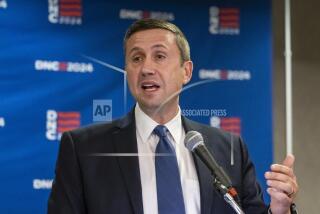U.S. Davis Cup Team Can’t Change Its Fate
- Share via
BROOKLINE, Mass. — Certainly this was a total team effort these past three days, the anatomy of a U.S. Davis Cup debacle. From the star’s reluctance to play singles to the shaky leadership of the captain all the way down to the team doctor being overruled at the last minute.
Finally, it took a neutral doctor with a locker at Longwood Cricket Club to make sense of it all on Sunday.
The late plan to replace American Todd Martin with Pete Sampras against Patrick Rafter in the reverse singles was thwarted when Dr. G. Richard Paul said Martin was fit to play less than an hour before his match. That belief was supported when Martin played for 3 hours 14 minutes.
But Rafter, the master of five-set marathons, secured the Davis Cup quarterfinal victory for Australia by defeating Martin, 4-6, 5-7, 6-3, 6-2, 6-4, twice rallying from a break down in the fifth. Then 18-year-old Lleyton Hewitt made it 4-1 for Australia, beating Alex O’Brien, 7-5, 6-4. Australia will next host Russia in the semifinals.
This was a difficult loss for the U.S. to take even without the off-court sideshows. The Australians were without Mark Philippoussis and doubles specialist Todd Woodbridge yet managed to survive the combination of chaos and controversy.
There was the constant mystery about Sampras playing singles. Martin found himself getting team-related information from an Australian reporter instead of U.S. captain Tom Gullikson. Gullikson had mentioned possibly replacing Martin should he be suffering from an injury or heat exhaustion.
Martin expressed his displeasure to Gullikson on Saturday night. But there he was on Sunday, saying he was suffering from heat exhaustion after a brief morning workout. U.S. team doctor David Altchek said Martin had an elevated core temperature and was “losing his normal coherence.”
By then, Sampras was warming up. But Paul disagreed with the others and the match referee, Stefan Fransson, accepted the decision of Paul, the neutral doctor.
“There was no evidence he was not fit to play the match today,” Paul told The Times.
Paul, an orthopedic surgeon at Boston University Medical Center, felt comfortable with the decision.
“It would have been less than the highest standard to create a medical withdrawal on this centennial event, the epitome of international sportsmanship,” he said. “The proof in the pudding was that he played 3 hours and 20 minutes and held his own.”
Gullikson denied there was any unethical behavior.
“I can tell you I didn’t call [Pete] Sampras until 11:30 this morning,” he said. “If we would have been trying to cheat--or whatever--he would have already hit and had eight rackets strung and been ready to play. But I called him at 11:30 this morning and he had no idea what was going on.
” . . . He said, ‘You’re joking, right?’ I said, ‘Pete, I’m dead serious.’ ” Said Australian coach Tony Roche: “This has always been in the cards. We always half-suspected this would happen.”
But Rafter and Aussie captain John Newcombe said they did not doubt the integrity of Martin. Martin wanted to give Newcombe his word that he didn’t feel he could compete.
Rafter was simply frustrated by the uncertainty. “I started getting fed up, I said: ‘Who the hell am I going to play?’ ” he said.
Said Newcombe: “I think it was a very unfair situation, yes. He [Rafter] was very uptight for two sets. He was wound up: ‘Who am I going to play?’ It is sort of ridiculous. You don’t know and it was five, 10 past 12 before he really had any idea.”
Martin, who needed fluids injected intravenously beforehand, played a brave match under the circumstances. Gullikson was concerned about his health and asked him if he could go on, late in the first set with Martin leading, 4-1.
“I was actually very distracted,” Martin said. “I had a very tough time controlling my emotions. My mother is here. I don’t think she was very pleased to see me in that state. I was more distracted and probably that helped. I sort of came in and out.”
Once it got to the fifth, the odds tilted in Rafter’s favor. He was strong in the final stretch, winning the last four games. Rafter is 12-2 in five-set matches, including a streak of 11 consecutive victories. He has not lost a five-set match since Wimbledon in 1994.
“When I get into a five-set match, I know that record and I feel comfortable, something picks me up when I get into a five-setter,” he said. “My body might not want to last, but my mind and everything else wants me to keep going.”
U.S. in Davis Cup
A look at the U.S. finishes in last five Davis Cups:
* 1999--lost to Australia in quarterfinals, 4-1
* 1998--lost to Italy in semifinals, 4-1
* 1997--lost to Sweden in finals, 5-0
* 1996--lost to Czech Republic in quarterfinals, 3-2
* 1995--defeated Russia in finals, 3-2
More to Read
Go beyond the scoreboard
Get the latest on L.A.'s teams in the daily Sports Report newsletter.
You may occasionally receive promotional content from the Los Angeles Times.









